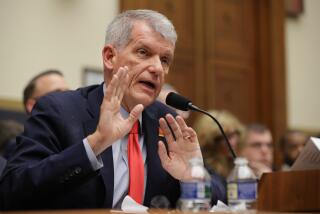Wells Fargo reports big tax savings — and big costs for investigations, lawsuits

The GOP tax overhaul saved Wells Fargo & Co. more than $3 billion in the fourth quarter, but the bank also set aside more than $3 billion to cover costs related to ongoing problems with its consumer businesses, the company reported Friday.
In its earnings release for the fourth quarter and full year, the San Francisco financial giant reported that the tax changes resulted in an immediate savings of $3.35 billion, thanks to a reduction in the company’s expected expenses for future taxes.
That’s a result of lowering the corporate tax rate to 21% from 35%, a major element of the overhaul that President Trump and congressional Republicans say should make American businesses more competitive globally and spur economic growth.
The reduction gave Wells Fargo, the third-largest U.S. bank by assets, a one-time bump for 2017’s final quarter and will result in smaller tax bills going forward.
The bank reported it expects to pay an effective tax rate of 19% this year, down from about 31% in previous years. That should amount to tax savings of more than $3 billion annually.
The bank said last month it plans to use part of those tax savings to boost its corporate philanthropy, pledging to make $400 million in donations this year, up 40% from $286 million last year.
It also said it would raise minimum pay for workers because of the tax savings, though the bank has raised minimum pay in each of the past few years and has declined to say whether raises would have happened had the tax law stalled.
Other companies, including AT&T and Wal-Mart, have announced pay raises, bonuses or both following the passage of the tax law, which has alternately been hailed as a potential job creator and pilloried as a corporate giveaway.
Ed Mills, a Washington policy analyst for financial services firm Raymond James, previously told The Times that corporate announcements about raises and bonuses tied to the tax law seemed designed to curry favor with Trump and congressional Republicans.
“What this administration has shown is the president very much pays attention to the headlines and kind of likes companies showing that his legislative actions and his regulatory actions can have a positive benefit for their employees,” Mills said.
The immediate tax savings for Wells Fargo, however, will be offset by an anticipated $3.25 billion in legal costs related to its unauthorized-accounts scandal, regulatory investigations into its mortgage business and “other consumer-related matters.” That’s on top of a similar, $1-billion charge the bank reported in the third quarter.
The bank has not yet had to pay those sums, but it is setting aside funds to cover potential legal settlements, penalties or other costs. The bank did not specify for which particular matters the new money has been set aside.
The huge figure illustrates the still-mounting costs of problems at the bank, which include creating as many as 3.5 million unauthorized checking, savings and credit card accounts, charging improper fees on mortgage borrowers and forcing auto-loan borrowers to pay for duplicative insurance policies. Those and other matters remain the subject of numerous lawsuits as well as investigations by state and federal officials.
On a conference call with investors Tuesday, Wells Fargo Chief Executive Timothy Sloan said the bank is still working to identify problematic practices and told analysts he could not guarantee the bank’s issues are behind it.
Analyst Matthew O’Connor of Deutsche Bank asked Sloan why, 15 months after the accounts scandal first came to light, he could not be sure all issues at the bank had been addressed.
“I’d love to live in a world where I can give you an absolute guarantee and certainty, but that’s just not the world we live in,” Sloan said.
He added that one of the bank’s failings in the past was not thoroughly monitoring and reviewing its practices on an ongoing basis — a mistake he said he doesn’t want to repeat.
“We’re never going to declare victory,” he said.
Despite expected legal costs, the bank saw revenue and profits climb in 2017, the first full year since the unauthorized-accounts scandal broke and a year during which additional problems — including the mortgage and auto insurance matters — came to light.
For the fourth quarter, the bank reported net income of $6.15 billion on revenue of $22.1 billion, both up about 2% from the same quarter the previous year. For the full year, net income reached $22.2 billion or $4.10 per share, an increase of 1% over 2016.
Contributing to profits was the bank’s ongoing efforts to cut about $4 billion from its annual operating expenses.
Among the strategies is to close branches as more consumers move to online and mobile banking. Wells Fargo reported that it consolidated 214 branches last year, leaving it with 5,861 retail branches at the end of the fourth quarter.
JPMorgan Chase, the largest U.S. bank by assets, also reported earnings Friday and, like Wells Fargo, expects to see higher profits because of lower tax rates.
JPMorgan estimated it will pay a 19% effective tax rate this year, down from 32% in 2017. Unlike for Wells Fargo, though, the tax law meant an upfront financial hit for JPMorgan. The bank reported an additional tax expense of $2.4 billion because of the new law, in large part because of a charge on repatriated foreign earnings.
The earnings of both Wells Fargo and JPMorgan were closely watched as they were the first large U.S. banks to report their numbers since the passage of the tax overhaul last month.
Other big banks, including Bank of America and Citigroup, are expected to take multibillion-dollar tax hits in the fourth quarter because of the tax bill. Those banks report earnings next week.
Shares of Wells Fargo closed at $62.55 Friday, down 46 cents or less than 1%.
Times staff writer Jim Puzzanghera contributed to this report.
Twitter: @jrkoren
UPDATES:
2:35 p.m.: This article was updated with additional earnings details and a comment by analyst Ed Mills.
11:45 a.m.: This article was updated with additional details, Wells Fargo’s share price and comments from analyst Matthew O’Connor and Chief Executive Timothy Sloan.
This article was originally published at 6:05 a.m.
More to Read
Inside the business of entertainment
The Wide Shot brings you news, analysis and insights on everything from streaming wars to production — and what it all means for the future.
You may occasionally receive promotional content from the Los Angeles Times.











